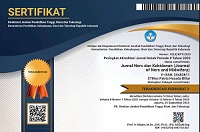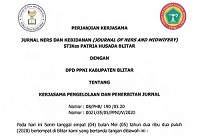The Effect of Early Self-Detection of Diabetes Mellitus on the Healthy Behavior of DM Risk Groups Based on Health Belief Model (HBM)
DOI:
https://doi.org/10.26699/jnk.v11i3.ART.p253-262Keywords:
Independent Early Detection, Diabetes mellitus, Risk Group, Healthy Behavior, HBMAbstract
Diabetes mellitus is a health problem throughout the world, and its prevalence continues to increase every year. Diabetes mellitus is often not realized by diabetics because it does not produce typical symptoms in the early period. Diabetes is a non-communicable disease (NCD) because of 80% unhealthy behavior. The problem in this research is that the diabetes risk group cannot yet carry out independent early detection of diabetes; they are not aware of their health conditions related to the incidence of DM, so they have not made efforts to change behavior to prevent diabetes mellitus and reduce risk factors that can be changed. This research aimed to determine the effect of early self-detection of diabetes mellitus on the health behavior of DM risk groups based on the Health Belief Model (HBM). This quantitative research used a quasi-experiment design with a one-group pre-post-test approach. The sample was 100 respondents by purposive sampling. The data collection used questionnaires based on HBM. The research intervention was by teaching the use of the SEDAB application and educating on healthy behavior to prevent DM; the interval between intervention and post-test was 4 weeks. Analysis of research data uses the Wilcoxon Signed Rank Test. The research results show that the intervention has the effect of increasing perceived susceptibility (p-value=0.000), Perceived Severity (p-value=0.000), Perceived Barriers (p-value=0.000), Perceived Benefit Perceived (p-value=0.000), cues to action (p-value=0.017), Self-efficacy (p-value=0.000), and healthy behavior (p-value=0.000). Early detection of diabetes in diabetes risk groups is essential to prevent DM and improve healthier lifestyles.
References
Afrasiabi, F., Aeen, F. B., & Jahromi, M. K. (2022). Applying the health belief model in identifying individual understanding towards prevention of type 2 diabetes. International Journal of Public Health Science, 11(4), 1267–1272. https://doi.org/10.11591/ijphs.v11i4.21908
Alyafei, A., & Easton-Carr, R. (2024). The Health Belief Model of Behavior Change. StatPearls Publishing. https://www.ncbi.nlm.nih.gov/books/NBK606120/
Cosic, V., Jakab, J., Pravecek, M. K., & Miskic, B. (2023). The Importance of Prediabetes Screening in the Prevention of Cardiovascular Disease. Medical Archives (Sarajevo, Bosnia and Herzegovina), 77(2), 97–104. https://doi.org/10.5455/medarh.2023.77.97-104
Echouffo-Tcheugui, J. B., & Selvin, E. (2021). Prediabetes and What It Means: The Epidemiological Evidence. Annual Review of Public Health, 42, 59–77. https://doi.org/10.1146/annurev-publhealth-090419-102644
Joiner, K. L., McEwen, L. N., Hurst, T. E., Adams, M. P., & Herman, W. H. (2022). Domains from the health belief model predict enrollment in the National Diabetes Prevention Program among insured adults with prediabetes. Journal of Diabetes and Its Complications, 36(7), 108220. https://doi.org/10.1016/j.jdiacomp.2022.108220
Kurnia, E., & Suprihatin. (2017). Perilaku Kesehatan Lansia Dengan Diabetes Mellitus Berdasarkan Teori Health-Belief-Model Di Kelurahan Bangsal. Stikes, 10(1), 1–8.
Li, E., Silverio, A., Cunningham, A., LaNoue, M. D., & Mills, G. (2021). Association of prediabetes status awareness with behaviors and perception of health. Journal of the American Board of Family Medicine, 34(1), 224–230. https://doi.org/10.3122/jabfm.2021.01.200146
Megawaty, I., & Syahrul, S. (2019). Educational Interventions in Diabetics With the Use of Health Belief Models: Literature Review. Indonesian Contemporary Nursing Journal (ICON Journal), 4(1), 1. https://doi.org/10.20956/icon.v4i1.5038
Melkamu, L., Berhe, R., & Handebo, S. (2021). Does patients’ perception affect self-care practices? The perspective of health belief model. Diabetes, Metabolic Syndrome and Obesity, 14, 2145–2154. https://doi.org/10.2147/DMSO.S306752
Nastiti, R. D., Hargono, A., Artanti, K. D., Martini, S., Li, C. Y., & Triyaniarta, A. R. (2024). Correlation of Morbidity With Smoking Status and Posbindu PTM To Prepare Aging Society Health Manifestation in Indonesia. Jurnal Biometrika Dan Kependudukan, 13(1), 109–121. https://doi.org/10.20473/jbk.v13i1.2024.109-121
Nurhidayah, Agustina, V., & Rayanti, R. E. (2020). Penerapan Perilaku Pencegahan Penyakit Diabetes Mellitus Menggunakan Health Belief Model Di Puskesmas Sidorejo Lor – Salatiga. Jurnal Keperawatan Muhammadiyah, 5(2), 61–69. https://doi.org/10.30651/jkm.v5i2.6280
Owei, I., Umekwe, N., Ceesay, F., & Dagogo-Jack, S. (2019). Awareness of Prediabetes Status and Subsequent Health Behavior, Body Weight, and Blood Glucose Levels. Journal of the American Board of Family Medicine : JABFM, 32(1), 20–27. https://doi.org/10.3122/jabfm.2019.01.180242
Priyanto, A., & Suprayetno, E. D. H. (2022). Efektifitas Self Detection For Diabetic (SEDAB) Untuk Deteksi Dini Diabetes Militus (T. Juwariah, E. Setiyorini, & N. A. Wulandari (eds.); Cetakan I). Media Nusa Creative (MNC Publishing).
Priyanto, A., Suprayitno, E. D. H., & Santo Suhirman, A. (2022). The Correlation of Early Detection Results using Self Detection Application for Diabetes (SEDAB) with Haemoglobin A1C (HBA1C) Levels. Jurnal Ners Dan Kebidanan (Journal of Ners and Midwifery), 9(2), 205–210. https://doi.org/10.26699/jnk.v9i2.ART.p205-210
Riskesdas, K. (2018). Hasil Utama Riset Kesehata Dasar (RISKESDAS). https://doi.org/10.1088/1751-8113/44/8/085201
Skoglund, G., Nilsson, B. B., Olsen, C. F., Bergland, A., & Hilde, G. (2022). Facilitators and barriers for lifestyle change in people with prediabetes: a meta-synthesis of qualitative studies. BMC Public Health, 22(1), 553. https://doi.org/10.1186/s12889-022-12885-8
Subramaniam, S., Dhillon, J. S., & Wan Ahmad, W. F. (2021). Behavioral theory-based framework for prediabetes self-care system—design perspectives and validation results. International Journal of Environmental Research and Public Health, 18(17). https://doi.org/10.3390/ijerph18179160
Tanoey, J., & Becher, H. (2021). Diabetes prevalence and risk factors of early-onset adult diabetes: results from the Indonesian family life survey. Global Health Action, 14(1), 2001144. https://doi.org/10.1080/16549716.2021.2001144
Zahedani, A. D., Veluvali, A., McLaughlin, T., Aghaeepour, N., Hosseinian, A., Agarwal, S., Ruan, J., Tripathi, S., Woodward, M., Hashemi, N., & Snyder, M. (2023). Digital health application integrating wearable data and behavioral patterns improves metabolic health. Npj Digital Medicine, 6(1). https://doi.org/10.1038/s41746-023-00956-y
Zakiyyah, A., Nugraha, P., & Indraswari, R. (2019). Faktor – Faktor Yang Berhubungan Dengan Kepatuhan Aktivitas Fisik Penderita Dm Untuk Pencegahan Komplikasi Di Wilayah Kerja Puskesmas Rowosari Kota Semarang. Jurnal Kesehatan Masyarakat, 7(1), 453–461. https://ejournal3.undip.ac.id/index.php/jkm/article/view/23067

Downloads
Published
How to Cite
Issue
Section
License
Copyright (c) 2024 Jurnal Ners dan Kebidanan (Journal of Ners and Midwifery)

This work is licensed under a Creative Commons Attribution-ShareAlike 4.0 International License.


 Google Scholar
Google Scholar

 Google Scholar
Google Scholar Sinta
Sinta ORCID
ORCID



